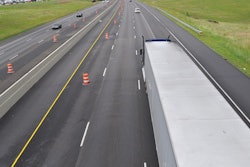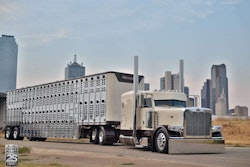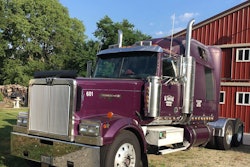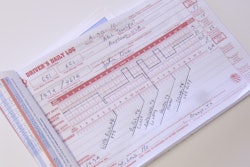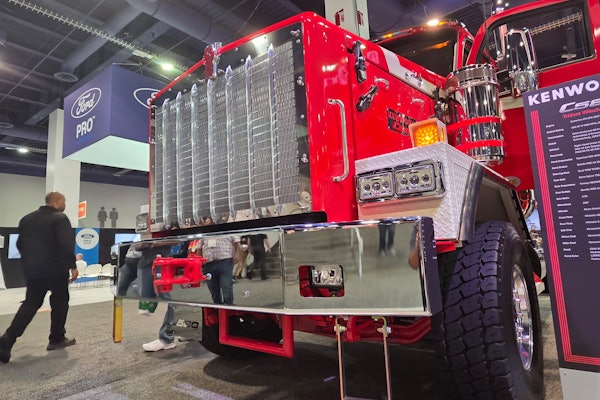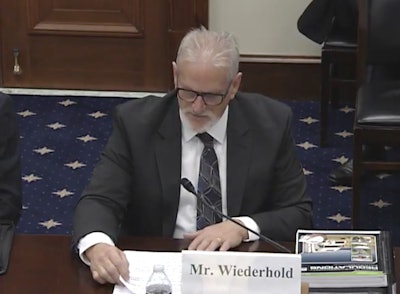 OOIDA board member Monte Wiederhold testified Wednesday in front of the House’s Small Business Committee about the challenges small trucking businesses face in regards to overregulation in the industry.
OOIDA board member Monte Wiederhold testified Wednesday in front of the House’s Small Business Committee about the challenges small trucking businesses face in regards to overregulation in the industry.Representatives from the owner-operator community and small fleet segment told lawmakers in Washington on Wednesday that federal regulations, particularly the inflexibility of current hours of service regs, crimp their productivity and their profitability.
The House Committee on Small Business heard Wednesday from owner-operators and small business truckers about federal regulations, including the ELD mandate, and their impact on small trucking businesses.
Truckers representing the Owner-Operator Independent Drivers Association and National Association of Small Trucking Companies and others from the American Pyrotechnics Association and National Ready Mixed Concrete Association voiced their concerns.
Monte Wiederhold, president of seven-truck fleet B.L. Reever Transport and OOIDA board member, told the House committee the negative attention the ELD mandate has received from owner-operators and small business truckers stems from the current rigidity of the hours of service regulations.
“These rules push drivers to drive farther and faster,” Wiederhold said. “There is no flexibility in the hours of service right now. The clock never stops, and it penalizes drivers who are trying to be safe.”

Wiederhold added that he’s not against the use of ELDs, but he is against the devices being mandated for all truckers. “For small businesses, it’s only a cost,” he said. “There are no savings as FMCSA has said.”
Marty DiGiacomo, owner-operator of True Blue Transportation and testifying on behalf of NASTC, told the committee he agrees with Wiederhold that ELDs shouldn’t be mandated
“If it benefits my business and helps me be safer, I’ll buy it,” he said. “Give us the choice. At some point, I could see looking into it if it benefits me, but right now, it doesn’t because the hours-of-service regulations are the biggest problem.”
Rep. Brian Babin (R-Texas), who is not a member of the Small Business Committee, was in attendance for the hearing because of his proposed legislation to delay the implementation of the ELD mandate. He told the committee he understands ELDs do work for some larger fleets, but the trucking industry doesn’t allow for a one-size-fits-all mandate.
“I’ve talked to constituents in my district and outside of my district that have grave concerns about the unknowns and the question marks about how safe the ELD mandate is,” he said. “I’m not trying to abolish ELDs. If it saves you money and makes you safer, keep using them. If you like your ELD, you can keep your ELD.”
Babin said his proposed legislation, which would delay ELD implementation for two years, is to give more time to “work out some questions on ELDs,” adding “it’s not unreasonable to ask [the DOT] for a waiver to get these questions answered.” However, despite gaining dozens of co-sponsors, Babin’s legislation to delay the ELD mandate has seen no action in Congress and likely won’t before the Dec. 18 adoption deadline.
Also testifying at the hearing were Stephen Pelkey with the American Pyrotechnics Association and Robert Garbini with the National Ready Mixed Concrete Association. Both stated that given the nature of their respective segments of the industry, the ELD mandate poses problems for their members.
In both industries, the actual driving of the truck is not the primary objective of the jobs, they said. In the case of the pyrotechnics workers, they typically drive between one and three hours from a warehouse to a fireworks site, then are required to set up the production at the site, Pelkey said. According to Garbini, ready mixed concrete truck drivers typically drive approximately 14 miles round-trip on the job and spend most of their time at construction sites.
In both cases, drivers operate under hours exemptions, and Pelkey noted current ELDs aren’t programmed to be able to satisfy those exemptions.
Committee Chairman Steve Chabot (R-Ohio) said it’s obvious there is disagreement between small and large trucking companies, and the committee will relay the concerns of small trucking businesses to their colleagues in Congress to consider easing the regulatory burden on the industry.

